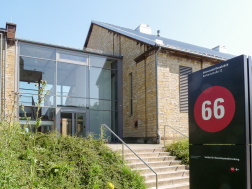Main content
Top content
20. January 2023 : Dr. Katrin Prager online at the 29th Systems Science Colloquium
Dr. Katrin Prager from the School of Geosciences at the University of Aberdeen presented her research at the 29th Systems Science Colloquium at the Institute of Environmental Systems Research on November 30, 2022.
The title of her presentation was "How can we use policy instruments to support farmer cooperation for environmental benefits? - Learning from the Countryside Stewardship Facilitation Fund." In her presentation, Dr. Prager outlined a policy program to promote pro-environmental cooperation among farmers in England.
More information on her research https://www.abdn.ac.uk/geosciences/people/profiles/katrin.prager
In her abstract, Dr. Katrin Prager described the topic of her presentation as follows:
How can we use policy instruments to support farmer cooperation for environmental benefits? - Learning from the Countryside Stewardship Facilitation Fund
Farmers cooperate in different ways and for different purposes, but cooperating in the implementation of agri-environmental measures is rare, and represents a different, more unique, case in relation to cooperation. Nevertheless, it is attractive to policy makers to supplement agri-environment schemes (AES) with mechanisms to incentivise farmer cooperation in order to achieve management that is coordinated at ‘landscape-scale’ and thus more effective for certain ecosystem services such as water quality, and biodiversity. In this talk, I will introduce the Countryside Stewardship Facilitation Fund (CSFF) in England as a policy intervention to develop cooperation amongst farmers and agree the agri-environmental management priorities that they plan to take forward across their holdings. Data from empirical research on the actual operation of six CSFF-funded groups in Cumbria and East Anglia was analysed from a social capital and collective action perspective. I found that key elements of social capital (connectedness, trust, norms) differed between cases, leading to different starting points for establishing groups. The resulting cooperation in agri-environmental management also varied depending on pre-existing networks. The CSFF supported steps to increase the capacity of individuals (and in some cases groups) to deliver agri-environmental outcomes via a facilitator, but struggled to create self-sustaining groups of farmers collaborating on agri-environmental management. The design of similar policy interventions needs to be explicit what kind of farmer cooperation is aimed for. It also needs to take into account the time required for building the prerequisite social capital, tensions between priorities of farmer-led groups and state-funded AES, and trade-offs between group cohesion and landscape-scale working.


